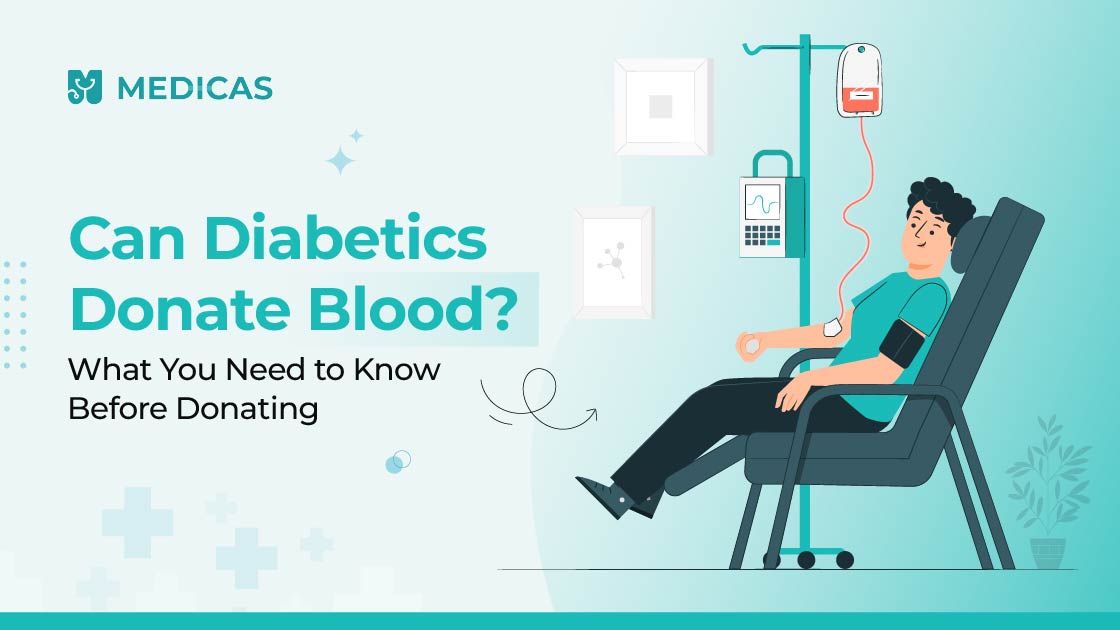Ever wondered if having diabetes means you can never roll up your sleeve and donate blood? Many people with diabetes feel unsure about their eligibility to help others this way. If you or a loved one is managing blood sugar levels, this guide will clarify whether diabetics can donate blood and what to consider before visiting the blood bank. It’s not just about your health; it’s also about keeping the person receiving your blood safe.
Understanding Diabetes and Blood Donation
Let’s first explore what diabetes is and its fundamental effects on the body.
Overview of Diabetes
Diabetes is a chronic condition that affects how the body uses blood sugar (glucose). There are mainly three types:
| Type of Diabetes | Cause | Managed by |
| Type 1 Diabetes | Autoimmune, insulin deficiency | Insulin therapy |
| Type 2 Diabetes | Insulin resistance | Oral medication, lifestyle changes |
| Gestational Diabetes | Hormonal changes in pregnancy | Diet, insulin if needed |
Understanding your type helps assess whether a diabetic patient can donate blood under current guidelines. For parents concerned about very young children, understanding the Early Signs of Type 1 Diabetes in Infants: What Every Parent Should Know can be incredibly important. Similarly, a common question that arises is whether diabetes can change its form; for a deeper dive into this area, explore Can Type 2 Diabetes Turn Into Type 1? Exploring the Complexities of Diabetes Transitions.
How Diabetes Affects the Body and Blood
Diabetes influences vessel health, nerve function, and hydration. High blood sugar can damage small vessels, affecting how the body responds to fluid and red blood cell loss. Well-controlled sugar levels minimise these risks. That said, diabetes and blood donation can go hand-in-hand when proper precautions are taken.
Can People with Diabetes Donate Blood?
Yes, but under specific conditions. So, if you’re wondering, “Can diabetics donate blood?” here’s what you need to know.
Eligibility Criteria for Diabetics
Most blood banks require:
- Stable blood sugar (HbA1c < 7.5% or as per local guidelines)
- No recent episodes of hypo- or hyperglycaemia
- No diabetic complications affecting the heart, kidneys, or vision
- You’re feeling healthy and fit on the day
- You meet standard donation criteria (age 18–65, weight above 50kg, no recent infections)
However, the method of managing your diabetes is also important.
Can Type 1 Diabetics Donate Blood?
Generally, individuals with Type 1 diabetes can donate blood. The key here is consistent blood sugar management and the absence of significant complications. It’s best to book an appointment with a diabetologist first.
Can Type 2 Diabetics Donate Blood?
Absolutely. Most people with Type 2 diabetes, especially those controlled through diet, exercise, or oral medications, are eligible. Just make sure your blood sugar is in a safe range on the day.
Who Should Avoid Donating Blood?
Avoid donating if you have:
- Recent significant blood sugar fluctuations
- Active infections or foot ulcers
- Uncontrolled high blood pressure or heart issues
- Serious diabetic complications (kidney, nerve, or eye problems)
- I am currently recovering from a recent illness.
Medications and Blood Donation: What You Should Know
Questions often arise about how medications, particularly those used to treat diabetes, affect blood donation eligibility.
Can You Donate Blood While on Insulin?
Insulin itself is not a barrier. The key is stability: no severe lows, good HbA1c, and physician approval. Maintain usual doses around donation, and carry fast-acting carbs to prevent dips.
Other Medications That May Affect Donation Eligibility
Some diabetes-related medications can impact eligibility.
- Anticoagulants: May require temporary deferral.
- Certain antibiotics: Wait 48–72 hours after completing the course.
- Oral hypoglycaemics: Generally acceptable if well tolerated.
Always disclose all medications during the pre-donation screening process.
Requirements for Safe Blood Donation with Diabetes
For a safe and successful donation with diabetes, careful preparation is essential.
Ideal Blood Sugar Levels Before Donation
Keep your fasting blood sugar level under 120 mg/dL and post-meal blood sugar level below 180 mg/dL on the day of donation. This helps prevent complications such as dizziness or fatigue.
What to Eat and Avoid Before Donating
To stay strong during and after donation, here’s what to eat:
| Eat | Avoid |
| Whole grains, fruits, and vegetables | Sugary snacks or energy drinks |
| Lean protein | Fatty or spicy foods |
| Plenty of water | Alcohol |
Tip: Never go on an empty stomach. Eat a balanced meal at least 2 hours before. your workout
Tips to Prepare for a Smooth Donation
A little preparation makes a big difference:
- Sleep well the night before.
- Carry glucose tablets or fruit juice.
- Stay hydrated. Home remedies like lemon-honey water help.
- Wear loose clothes
- Carry a list of medications
- Rest 10 minutes before and after the process.
Consider exploring How Pilates Can Benefit People With Diabetes-The Ultimate Guide! for ways to maintain good health and potentially aid your eligibility for donation in the future.
What Happens During and After Donation for Diabetics
The donation process for individuals with diabetes is largely the same as for non-diabetics, but with a few extra considerations for monitoring your well-being.
Monitoring Your Blood Sugar Post-Donation
Blood loss can cause mild stress, which in turn alters sugar levels. Check at 30 minutes, 2 hours, and that evening. Treat any dip with fast carbs, glucose tabs or fruit juice.
Signs to Watch Out for After Giving Blood
Call your doctor or seek help if you notice:
- Dizziness or fainting
- Blurred vision
- Nausea
- Cold sweats
- Tremors
- Persistent thirst, dry mouth
- Bruising or prolonged bleeding at the needle site
In such cases, lie down, sip water slowly, and monitor your blood sugar.
Final Thoughts: Should Diabetics Consider Donating Blood?
So, can a diabetic person donate blood? Yes, with responsible preparation, monitoring, and medical guidance, donating blood is both safe and impactful. It can be an empowering way to give back. However, if you’re unsure, consider booking an online doctor consultation to assess your health and eligibility. If you’re managing diabetes and are otherwise healthy, you’re likely in good health. Just follow the right precautions and don’t hesitate to book lab tests through Medicas to keep track of your health.
Frequently Asked Questions on Diabetics and Blood Donation
- Can type 1 diabetics donate blood?
Yes, but conditionally. If your sugar levels are well-managed and you have no complications, some centres may allow it. It’s important to book an appointment and discuss this with your doctor beforehand.
- Can people with Type 2 diabetes donate blood?
Yes, especially if the diabetes is managed through lifestyle or oral medications. Type 2 diabetics often make up a large group of eligible donors.
- Is it safe to donate blood while on insulin?
Insulin itself is not a barrier. Ensure tight glycaemic control, carry fast-acting carbs, and inform staff of your diabetes to manage any potential dips.
- What should diabetics eat before donating blood?
Opt for complex carbohydrates, lean proteins, fruits with fibre, and plenty of fluids. Avoid sugary drinks, caffeine, and fatty meals.
- Can donating blood affect blood sugar levels?
Blood loss and stress can cause mild fluctuations in blood pressure. Monitor closely post-donation, checking at intervals, and treat any hypoglycaemia promptly with fast-acting carbohydrates.
Disclaimer
Medical Advice: The information provided in this blog post is for educational purposes only and should not be considered as a substitute for professional medical advice, diagnosis, or treatment. Always consult with a qualified healthcare professional for personalized guidance regarding your specific medical condition.
Accuracy of Information: While we strive to provide accurate and up-to-date information, the field of medicine and viral fevers is constantly evolving. The content in this blog post may not reflect the most current research or medical guidelines. Therefore, it is advisable to cross-check any information provided with reliable sources or consult a healthcare professional.
Individual Variations: The symptoms, causes, treatment options, and preventive measures discussed in this blog post are general in nature and may not apply to everyone. It is important to remember that each individual’s situation is unique, and personalized medical advice should be sought when making healthcare decisions.
External Links: This blog post may contain links to external websites or resources for additional information. However, we do not endorse or have control over the content of these third-party websites. Accessing these links is done at your own risk, and we are not responsible for any consequences or damages that may arise from visiting these external sources.
Results May Vary: The effectiveness of treatment options or preventive measures mentioned in this blog post may vary from person to person. What works for one individual may not work the same way for another. It is essential to consult with a healthcare professional for personalized advice tailored to your specific needs.

Dr. Pratibha Shukla is a Diabetologist and Family Physician based in Mumbai, Maharashtra, with 8 years of clinical experience. She holds an MBBS, along with additional certifications including AFIH, PGDFM, CCEBDM, CCCS, and CCCMH, with a focus on diabetes care, family medicine, and occupational health. Dr. Shukla has worked with organizations such as ONGC, RCF Ltd., BARC Hospital, and under NHM programs, gaining experience in both clinical and community healthcare. Her expertise includes the management of diabetes, endocrine disorders, and chronic lifestyle diseases.


